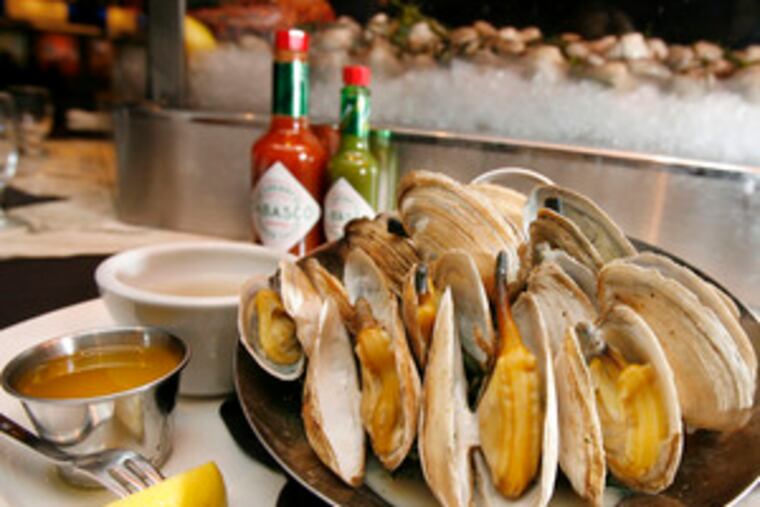Legal Sea Foods
The people who scout sites for Houlihan's "must be geniuses," Roger Berkowitz confides over the phone, practically giddy at having landed yet another abandoned fern-bar shell for his growing seafood chain, Legal Sea Foods.

The people who scout sites for Houlihan's "must be geniuses," Roger Berkowitz confides over the phone, practically giddy at having landed yet another abandoned fern-bar shell for his growing seafood chain, Legal Sea Foods.
This one is in the Court at King of Prussia, the first Pennsylvania location for the Boston-based chain. And if the beeper-toting crowds waiting for a seat on a sweltering midsummer weeknight are any indication, Legal is already cashing in on the lucrative real estate wisdom handed down from the Chain Elders.
"But we don't like to think of ourselves as a chain," Berkowitz tells me. "We still think of ourselves as fish people who operate restaurants."
The second-generation president of Legal Sea Foods, Berkowitz is a charming bundle of contradictions like this, at one moment revealing why he's one of the country's most savvy restaurant execs, at another spinning a down-home attitude that is as authentic as his creamy "chowdah."
Old-line Bostonians still conjure up fond memories of when Legal Sea Foods was just that - a casual extension of the family fish shop in Cambridge's Inman Square, where locals ate from paper plates at picnic tables laden with fish and chips and crisply fried clam bellies.
But such old-line fish houses had to evolve if they were to thrive - as Philadelphians know all too well. Having witnessed our own unevolved fish-house tradition essentially collapse, the region is suddenly a feeding ground for bigger corporate fish from distant waters.
The Oceanaire, Bonefish Grill and McCormick & Schmick have already arrived from Minneapolis, Florida, and Portland, Ore., respectively. And now, Baltimore-based Phillips has pulled in from the south just as Legal cruises down from the north.
It can be hard to tell them apart if you're simply looking at the mall-crowd clientele, the cheery but overprogrammed staff, and the slick corporate decor.
This Legal is that and more. Its water wall and layered stone columns, its handsome blue-and-white pendant box lamps, plush booths, and plasma-screen-decked bar are a far cry from (and considerably more expensive than) its days of paper-plate innocence.
Legal has mastered the art of corporate consistency, pre-preparing a chunk of its menu - from fish portioning to sauces and its signature chowder - at its processing plant in Boston.
This isn't a bad thing. Legal goes to great lengths at its plant to scientifically test for things like mercury and harmful bacteria. And the quality of its seafood is pristine, an important point for raw-bar lovers like my neighbor at the bar, a conventioneer from Manhattan who was slurping down her glistening plate of raw littlenecks after a strenuous round of tax-free shopping.
I one-upped her with Treasures of the Reef - a double-tiered platter of briny cold oysters, fleshy pink cherrystones, snappy shrimp cocktail, and half a steamed lobster that was as sweet as summer corn. And that was just the small $29 value version.
A great raw bar is clearly the perfect pick-me-up for the shopping-weary. But Legal also has something many of the other chains don't - a distinct identity, drawn from the traditional New England cookery that is still the heart and soul of this menu.
A pan of steamed soft-shell clams (a.k.a. steamers) is a rarity around here worth seeking, and Legal does them perfectly. Slip the sock off the little strip, swish the belly in its juice, dip in molten butter, and then let the mollusk melt, a mouthful of lightly salted clam pudding and tender meat.
Deep-fried inside a delicate cornmeal crust, the belly clams are just as addictive. (The fried oysters are also tender, with a surprising cinnamon dusting of cassia salt.) The clam finds its ideal canvas in Legal's chowder, a richly creamed broth studded with chopped meat, firm potato cubes, and a proper backbone of salt pork, rather than common smoked bacon.
Like its competition, Legal's menu ventures beyond New England, and you go there at your own risk. A mini-wok full of kung pao shrimp was a surprise winner - the plump crustaceans tossed in a spicy, exotic sauce. But a trendy fusion appetizer of "Alaskan butterfish" (a.k.a. black bass) marinated in the lees of sake was an unappetizingly yellow and ragged slice of fish. The wood-grilled items should be straightforward, but our halibut was both charred on the outside and raw at the center (it was kindly taken off the bill). The swordfish with onion relish was a nice slice of fish, but dry.
The "everything" tuna was odd - thickly crusted in seeds (like the bagel that inspired it), then paired with a Greek yogurt schmear of tzatziki.
Stick with the classics. The fish and chips brought flaky haddock inside a perfect greaseless crust. The Romano cheese-breaded soft-shell crabs were meaty and sweet. The stuffed shrimp were leaden, but the little filet was an excellent "turf" to the shrimp's bready "surf."
Legal also served a satisfying but ridiculously expensive steamed lobster - even if $55 for the 21/2-pounder is an accurate reflection of this year's volatile lobster prices. I'd prefer the more economical lobster roll at lunch.
There are straightforward-but-decent renditions of cheesecake, Key lime pie, Boston cream pie, and chocolate-coated ice cream bonbons for dessert.
But the end of the meal takes an unexpectedly high-tech turn when the waiter brings a swipe-your-own-credit-card terminal to the table. It's just the kind of wireless gizmo that chains seem to covet these days - though in this case, Legal is pioneering credit-card safety.
Having been on the phone that very morning with the fraud department of my own credit-card company, I take a swipe, lick the savor of fried clams from my lips, and smile.